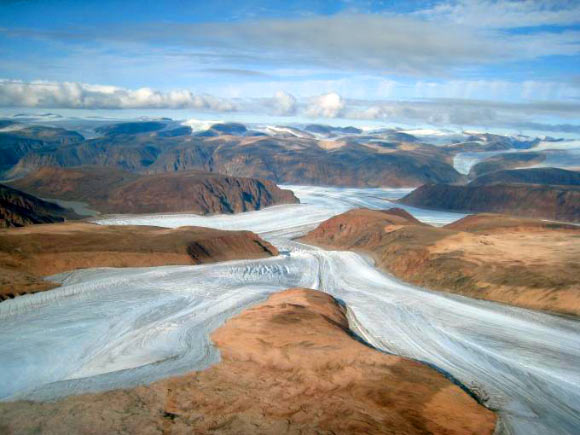Radiocarbon dating of ancient moss clumps on Baffin Island in the Eastern Canadian Arctic suggests that local summer temperatures during the past 100 years were higher than during any century in the past 44,000 years and perhaps as long ago as 120,000 years.
Prof Gifford Miller from the University of Colorado at Boulder, who is the lead author of a paper published in the Geophysical Research Letters, said: “the study is the first direct evidence the present warmth in the Eastern Canadian Arctic exceeds the peak warmth there in the Early Holocene, when the amount of the Sun’s energy reaching the Northern Hemisphere in summer was roughly 9 percent greater than today.”
“The Holocene is a geological epoch that began after Earth’s last glacial period ended roughly 11,700 years ago and which continues today.”
Dr Miller and his colleagues used dead moss clumps on Baffin Island as tiny clocks. At four different ice caps, radiocarbon dates show the mosses had not been exposed to the elements since at least 44,000 to 51,000 years ago.
“Since radiocarbon dating is only accurate to about 50,000 years and because Earth’s geological record shows it was in a glaciation stage prior to that time, the indications are that Canadian Arctic temperatures today have not been matched or exceeded for roughly 120,000 years,” Prof Miller said.
“The key piece here is just how unprecedented the warming of Arctic Canada is. This study really says the warming we are seeing is outside any kind of known natural variability, and it has to be due to increased greenhouse gases in the atmosphere.”
The team compiled the age distribution of 145 radiocarbon-dated plants in the highlands of Baffin Island that were exposed by ice recession during the year they were collected by the researchers.
All samples collected were within 1 m of the ice caps, which are generally receding by 2 to 3 m a year.
Located just east of Greenland, the 196,000-square-mile Baffin Island is the fifth largest island in the world. Most of it lies above the Arctic Circle. Many of the ice caps on the highlands of Baffin Island rest on relatively flat terrain, usually frozen to their beds.
To reconstruct the past climate of Baffin Island beyond the limit of radiocarbon dating, the team used data from ice cores previously retrieved by international teams from the nearby Greenland Ice Sheet.
“The ice cores showed that the youngest time interval from which summer temperatures in the Arctic were plausibly as warm as today is about 120,000 years ago, near the end of the last interglacial period. We suggest this is the most likely age of these samples,” Prof Miller said.
The new study also showed summer temperatures cooled in the Canadian Arctic by about 5 degrees Fahrenheit from roughly 5,000 years ago to about 100 years ago – a period that included the Little Ice Age from 1275 to about 1900.
______
Bibliographic information: Miller GH et al. Unprecedented recent summer warmth in Arctic Canada. Geophysical Research Letters, published online October 21, 2013; doi: 10.1002/2013GL057188








